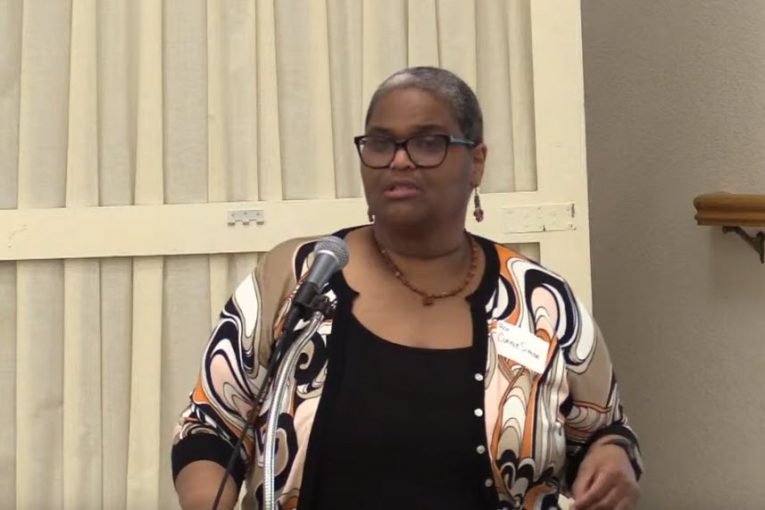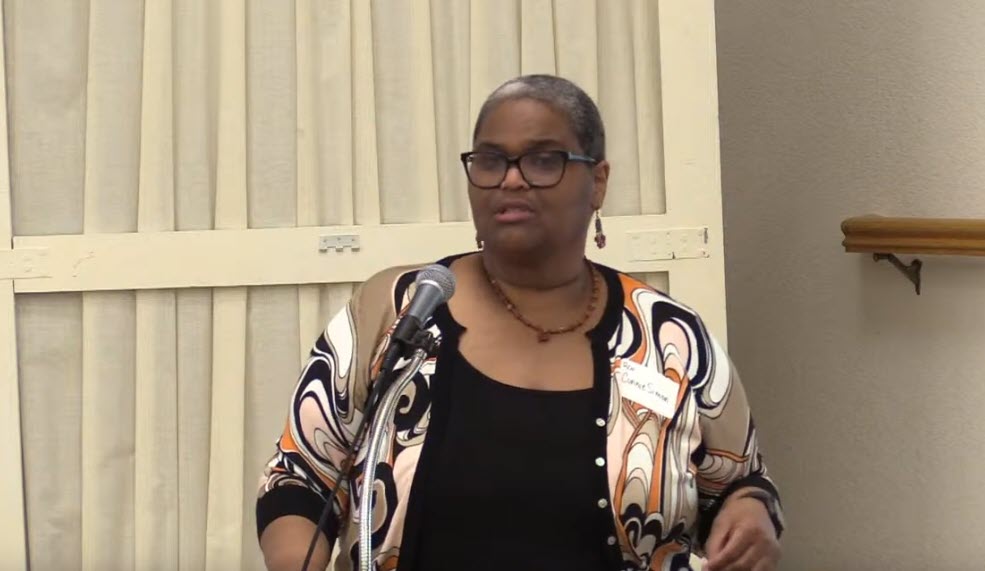

Editor’s Note: On Thursday, Interfaith Housing Justice of Davis presented “Davis Housing Solutions: A Community Conversation” – a forum at the Davis Community Church. What follows are the full comments by Connie Simon of the Unitarian Universalist Church of Davis.
Remarks by Rev. Connie Simon…
So I prepared what I wanted to say and then when I walked in the door, someone said to me, you’re a short timer. Just let ’em have it
Because I’ve been here for just short of two years and as of June 30, my service as the interim minister of the UU Church of Davis will end and I’ll be moving on to help another church through transition, but that’s not what I want to you about. What I want to talk to you about is the day, two years ago I got the call that said, you’re going to Davis, California. This is the process. It happens for us. It’s always this week in May and I started making phone calls to apartment complexes in Davis and I said, I need a place to live for July. I’d like two bedrooms and I want some outdoor space  with assigned parking and pool would be nice and some things and their reaction was like yours. One place actually laughed at me and said, you should have been here in January or February, and I said, that’s not possible.
with assigned parking and pool would be nice and some things and their reaction was like yours. One place actually laughed at me and said, you should have been here in January or February, and I said, that’s not possible.
And it was true and that is why I serve the Unitarian Universalist Church of Davis and I live in West Sacramento and I’ve wondered about Davis housing. It made me start thinking as I drove around, I said, I’m going to check this out even more and more. And I saw there’s not enough housing here and what is here is too expensive for the people who are here and I got to call it out. I wasn’t seeing a lot of people who look like me. I wasn’t seeing a lot of black and brown people in the neighborhoods where I thought I wanted to live, and I’m not sure what that says. That’s for you to decide. The next thing I did was drive around in West Sacramento and Sacramento and I saw people who were unhoused living in ways that I had never seen before. I’m an East coast girl.
Homelessness looks different for us. I had never seen whole blocks of people living in tents or when I drive from West Sac and come here to come the church, there are always tents along Capitol Highway or along Jefferson or when I get off 80; that’s not acceptable. It’s not. Or the fact that there is a woman who lives in her car and comes and parks her car in my apartment complex because it’s safe. Something about this picture isn’t right. The cost of housing here is absurd. It’s absurd and there’s not enough. And even if you can get housing, even if you can, how do you pay for the $5 gas? How do you pay for the expensive groceries? We have an equity issue in our society, a big one.
So people say to me, yeah, yeah, yeah, Reverend Connie, it’s like that, I worked hard. Why can’t they just work hard? Where are they going to work? And as I said, many of them are already working. How much salary would you have to make to even be able to afford a small apartment here? It’s not sustainable. And whose job is it to fix it? Well, Reverend Connie, you’re the minister. Tell us what to do. I can’t know what to do in every place, but what I do know is that it is my work to do. What I do know is that it is your work to do as well.
If we are to truly be living in community, it is our religious and moral imperative. It is our obligation to make sure that our neighbors have shelter, that our neighbors have food, that they have access to clean water, that they have access to quality education. That is our work to do not because it gives us pride to be standing out and being up at the stage and saying all these things, but because it’s the right thing to do. I have been thinking about why. Why is it our job to do? Because one, we are better together. There are so many problems in the world right now. So many things going on. We can’t fix just one thing. They are all interconnected as are we. So we are much better when we work together to solve these problems. Don’t just say, I do housing, I don’t do hunger, I do climate. I don’t do race. They are all connected.
You can’t say, well, I’m Catholic, I’m Jewish, I’m this, I’m that. We are all connected. We must do this work together. Despite having different beliefs, we should be able to work together as a society to address these problems that are plaguing us right now, whether it be housing, hunger or job opportunities. So no matter what faith we profess, whether or how we worship the connections between us are sacred as individuals, we may be speaking different languages and voicing different theologies or maybe no theology at all. Maybe you are humanist or atheist or agnostic. It doesn’t matter. We are humans existing together in this space and at the root of that connection is a thread of humanity that connects us all. At the root of that is this light that is shining in every one of us, not just me the minister, but yes, it’s shining in the woman who’s living in her car. It’s shining in the student who’s outside. It’s shining in each one of you. Who are we to decide that one person’s situation is not worth our concern?
Could be us tomorrow. For many of us, that’s all it would take. One paycheck, one drop in the stock market, the loss of a retirement account, your company folding an illness or one major car repair. We are all but an inch away.
So my charge to each of you is to keep an open heart and an open mind tonight so that we can envision what’s possible. My charge to each of you is to take courage, to do the work that needs to be done and to look for creativity and innovation in new ways of doing it, to be resilient and determined and to be fearless in taking risks.
We have no choice but to do this together. We’re not going to make it if we try to go it alone—let’s do the work.

Reverend Connie was an inspirational initial speaker Thursday night. Her comments were insightful … and challenging.
Her message was clear and unambiguous. The housing Davis needs is affordable housing and housing for the people in our community who are unhoused.
I agree with that 100%.